Profiles of Natural Resource Professionals on the Olympic Peninsula
Liam Antrim, Olympic Coast National Marine Sanctuary
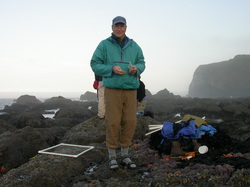
As a Resources Protection Specialist for the Olympic Coast National Marine Sanctuary, Liam Antrim has a complex job that covers a variety of interesting, sometimes exciting issues. In his line of work there are a many different things to deal with like getting marine debris off the outer coast and minimizing human disturbance to wildlife in the area. He also works on policy and planning for the sanctuary, along with supporting the sanctuary’s research program. The skills that required for this job are a higher education in sciences, and strong writing, communication, and technical skills.
Liam’s past work as a field technician on wildlife biology projects, SCUBA diver doing nearshore habitat restoration, and toxicologist led him on a pathway to understand human impacts on the marine ecosystems. His enjoyment of the outdoors helps him appreciate the work he has chosen. All this has shaped his philosophy on the relationship between humans and the natural world, which is, people are part of the natural
world but tend to think we are separate. It is really important that humans figure out how to live sustainably on this planet.
Liam also enjoys playing outside and exploring with family and friends, skiing, bike riding, gardening and making music. His advice for anyone who hopes to enter this field of work is to get a higher education, get outside to explore, seek out people working on things you are interested in, try different things, and find your passion.
Liam’s past work as a field technician on wildlife biology projects, SCUBA diver doing nearshore habitat restoration, and toxicologist led him on a pathway to understand human impacts on the marine ecosystems. His enjoyment of the outdoors helps him appreciate the work he has chosen. All this has shaped his philosophy on the relationship between humans and the natural world, which is, people are part of the natural
world but tend to think we are separate. It is really important that humans figure out how to live sustainably on this planet.
Liam also enjoys playing outside and exploring with family and friends, skiing, bike riding, gardening and making music. His advice for anyone who hopes to enter this field of work is to get a higher education, get outside to explore, seek out people working on things you are interested in, try different things, and find your passion.
Ed Chadd, Streamkeepers of Clallam County
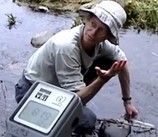
As a kid Ed Chadd liked to play in empty lots, catch bugs, go on hikes, sleep under the stars, and skip rocks in the ocean. When he got older he became a high school English teacher, and then carried on to follow his passion with the outdoors and get his degree in environmental science through Western Washington University’s Huxley College in Port Angeles. Part of his motivation to switch to natural resources was that education should be more connected to the outdoors and community.
Following his switch from classroom teaching, he did outdoor education for Outward Bound. He worked with students in many areas building trails in the National Parks and rehabilitating streams. During some stream work he accidently made a mess with the muck and he thought the creek looked horrible. He shoveled muck out of the stream and when he returned it was very clear and for the first time in years there were baby coho salmon. This amazing experience made Ed want to get more into this type of work.
Now, Ed runs the Streamkeepers program (http://www.clallam.net/SK/). He recruits volunteers to monitor the health of our local creeks. He has to find out from the experts in Streamkeepers what needs to be done in the streams and he helps get it done. He wrote the Streamkeepers handbook including the monitoring protocols and tools. His advice to people considering work in natural resources is try to follow your passion and have a lot of
motivation.
Following his switch from classroom teaching, he did outdoor education for Outward Bound. He worked with students in many areas building trails in the National Parks and rehabilitating streams. During some stream work he accidently made a mess with the muck and he thought the creek looked horrible. He shoveled muck out of the stream and when he returned it was very clear and for the first time in years there were baby coho salmon. This amazing experience made Ed want to get more into this type of work.
Now, Ed runs the Streamkeepers program (http://www.clallam.net/SK/). He recruits volunteers to monitor the health of our local creeks. He has to find out from the experts in Streamkeepers what needs to be done in the streams and he helps get it done. He wrote the Streamkeepers handbook including the monitoring protocols and tools. His advice to people considering work in natural resources is try to follow your passion and have a lot of
motivation.
Reed Wendel, Green Crow
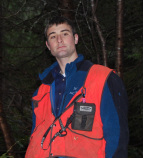
Reed Wendel has been working in natural resources since 2001 when he got a job as a National Parks fire fighter. Reed graduated from Port Angeles High School and has a bachelor’s degree in sustainable resource science and a master’s degree in forest ecology from the University of Washington. Reed prefers to work outdoors. Being a forester he gets to be outside since the job requires him to do forest inventory and timber cruising (which entails measuring trees and figuring out the volume of their wood stock). The skills required for this job are outdoor navigation, orienteering, mathematical understanding, communication and knowledge of digital equipment. Reed has worked throughout Washington, California, Arizona, Utah and Oregon. When he’s not working he enjoys hiking, fishing and other outdoor activities. Reed’s advice for anyone looking to enter the natural resources career field is to start working as soon as possible, even if it’s just volunteer work and don’t be afraid to contact companies or individuals about getting a job.
Jac Entringer, North Olympic Salmon Coalition
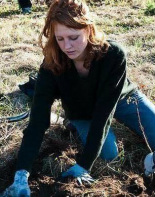
Jac Entringer’s path to her career in natural resources led first through art and health professions.
At the age of 20 she decided the outdoors was her true calling. With this new-found passion, she got a bachelors degree in science and did two years in AmeriCorps. What got Jac hooked in to natural resources was she loves the outdoors and working with others and in her Volunteer & Outreach Coordinator job she does just that. Jac also said some skills needed for her current job are to be positive, motivated, and prepared. Here are some places she has worked: Snow Creek, Morse Creek, and Clallam Bay.
Jac gave some advice that would help someone going in to natural resources: if you get involved in what you like and look for opportunities you will be better off. Jac’s philosophy on the relationship between people and the natural world is that we are a part of the world and the world is part of us so we need to take care of it as much as we can.
At the age of 20 she decided the outdoors was her true calling. With this new-found passion, she got a bachelors degree in science and did two years in AmeriCorps. What got Jac hooked in to natural resources was she loves the outdoors and working with others and in her Volunteer & Outreach Coordinator job she does just that. Jac also said some skills needed for her current job are to be positive, motivated, and prepared. Here are some places she has worked: Snow Creek, Morse Creek, and Clallam Bay.
Jac gave some advice that would help someone going in to natural resources: if you get involved in what you like and look for opportunities you will be better off. Jac’s philosophy on the relationship between people and the natural world is that we are a part of the world and the world is part of us so we need to take care of it as much as we can.
Helen Freilich, City of Port Angeles
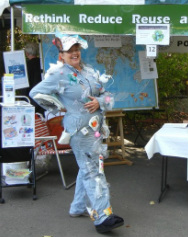
Helen Freilich was hooked on natural resources when she had a tenth grade biology class with an inspiring teacher. In her career as a natural resource professional she has held the title of outdoor educator and interpretive planner. Along her path she has earned her bachelors in biology and her masters in science and environmental education. Her current job as a waste reduction specialist for the city of Port Angeles entails managing curbside recycling along with selling compost and teaching how to backyard compost. Her favorite part on the job is promoting waste reduction and recycling in Clallam County. Her hobbies include gardening and composting as well as hiking in our national parks and skiing on the beautiful mountains of Washington State. For her line of work Helen suggests good teaching skills as well as speaking and writing skills. A sturdy understanding of the technical aspects of hazardous waste is also necessary for what Helen does. As advice towards those who want to enter a natural resources career she says to get as much experience as possible through internships.
The following is the philosophy of natural resources that Helen wishes to share with everyone. We are part of the natural world and we need to take care of it by taking care of our environment. We need to try to make as little waste as possible and we need to take care of the waste that we do make. The circle of life is cut when we make waste and do nothing to take care of it. We must reduce and reuse in order for the circle of life to continue.
The following is the philosophy of natural resources that Helen wishes to share with everyone. We are part of the natural world and we need to take care of it by taking care of our environment. We need to try to make as little waste as possible and we need to take care of the waste that we do make. The circle of life is cut when we make waste and do nothing to take care of it. We must reduce and reuse in order for the circle of life to continue.
Ann Renker, Makah Tribe
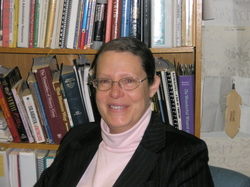
Dr. Ann Renker is the Anthropologist of the Makah Tribe. As the anthropologist, her job is to research and write expert legal opinions that support the Tribe’s right to fishing, sea mammal hunting and land animal hunting. Dr. Renker obtained her PhD
as an anthropologist, and before her current job, she was the Director of the Makah Tribal language program and the Director of the Makah Museum. Those jobs helped her prepare for the people side of anthropology. Dr. Renker brings to us a philosophy from the people side of the profession, “People need to be informed stewards and consumers. I don’t believe people need to be expressive consumers.”
In the field of anthropology, Dr. Renker said it would be best to make good use of opportunities that are offered to you outside of the traditional classroom, even if it is not an actual job. When in anthropology you must be persistent and keep trying new routes to
get the information you want, because the information you need may not come the same way as other information has come to you.
Outside of work, Dr. Renker loves to garden, travel, and play with her grandchildren as part of her hobbies. Aside from being an anthropologist, Dr. Renker is also the Principal of the Neah Bay High School and the Markishtum Middle School also located in Neah Bay, WA.
as an anthropologist, and before her current job, she was the Director of the Makah Tribal language program and the Director of the Makah Museum. Those jobs helped her prepare for the people side of anthropology. Dr. Renker brings to us a philosophy from the people side of the profession, “People need to be informed stewards and consumers. I don’t believe people need to be expressive consumers.”
In the field of anthropology, Dr. Renker said it would be best to make good use of opportunities that are offered to you outside of the traditional classroom, even if it is not an actual job. When in anthropology you must be persistent and keep trying new routes to
get the information you want, because the information you need may not come the same way as other information has come to you.
Outside of work, Dr. Renker loves to garden, travel, and play with her grandchildren as part of her hobbies. Aside from being an anthropologist, Dr. Renker is also the Principal of the Neah Bay High School and the Markishtum Middle School also located in Neah Bay, WA.
Deborah Moriarty, Feiro Marine Life Center
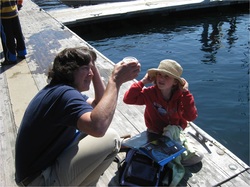
Growing up on a homestead in the remote areas of northern British Columbia gave Deborah her appreciation for nature. Her love of the marine environment was instilled when she would spend her summers as a child vacationing at the beach and snorkeling the shallow waters of quiet bays. Deborah studied marine biology at the University of British Columbia and also received her scuba certification. She later returned to school to receive a degree in Environmental Policy and Planning at WWU Huxley College of the Environment. Deborah felt that this was a way to connect her appreciation of science with the policy needed to make change.
Deborah moved to the Peninsula with her family because of the beauty and outdoor opportunities available. She feels fortunate that she was able to find a job she loves to do. Deborah is the Director of the Feiro Marine Life Center and her job includes grant writing, coordinating education, working with visitors to the center and learning something new every day about the marine life in the area.
The advice she would give someone going into a natural resource career is to try it first by volunteering, there are hundreds of opportunities, and, as with any career, do it because you are passionate about it.
Deborah moved to the Peninsula with her family because of the beauty and outdoor opportunities available. She feels fortunate that she was able to find a job she loves to do. Deborah is the Director of the Feiro Marine Life Center and her job includes grant writing, coordinating education, working with visitors to the center and learning something new every day about the marine life in the area.
The advice she would give someone going into a natural resource career is to try it first by volunteering, there are hundreds of opportunities, and, as with any career, do it because you are passionate about it.
Steven Fradkin, Olympic National Park
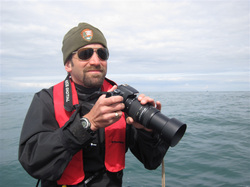
Steve Fradkin, Coastal Ecologist with Olympic National Park, was first inspired in natural resources while bird watching with his friends as a 12 year-old. To pursue his career he went to a whole lot of school including Michigan State University, Dartmouth University and University of Oregon. He focused his studies on zoology, aquatic ecology and marine biology. He chose to work in Olympic National Park because it is 95% wilderness. He likes being near the ocean, fresh water lakes and the mountains. The most interesting place he has worked is the Bailey Range in Olympic National Park. His favorite part of his job is being able to work out in the field; he does long term monitoring, coastal invertebrate and sea weed research, and Lake Crescent water quality sampling. His advice to people who are interested in a natural resources career is this. “Follow what you’re interested in.” His last word of advice is to get a good school background so you can have options for your future.
Heidi Pedersen, Olympic Coast National Marine Sanctuary
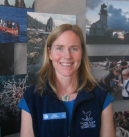
Heidi Peterson, Volunteer Coordinator for the Olympic Coast National Marine Sanctuary (OCNMS), started her journey in to the natural resource career field in a biology class while she was earning her bachelor’s degree. Her pathway after college went through volunteer projects and field work, where she worked with Olympic National Park and Point Reyes Bird Observatory along with a few other places.
In her current job she coordinates citizen scientist volunteers who want to work with OCNMS. Her advice to someone going into a natural resource career is this. “Have good people skills, like being outdoors, get as much education as you can and do as much volunteer work as you can.” If you want a career in natural resources or just want to volunteer, here is her contact information: (360-457-6622 x 32.)
Her favorite part of her job is that she gets to be outdoors often, and even when she is not working she loves to be doing basically anything that is outdoors. A couple more of her hobbies are spending time with her family and reading, or better yet reading while she is outdoors. Her philosophy about the relationship between people and the natural world is, “People have a responsibility to take care of the natural world.”
In her current job she coordinates citizen scientist volunteers who want to work with OCNMS. Her advice to someone going into a natural resource career is this. “Have good people skills, like being outdoors, get as much education as you can and do as much volunteer work as you can.” If you want a career in natural resources or just want to volunteer, here is her contact information: (360-457-6622 x 32.)
Her favorite part of her job is that she gets to be outdoors often, and even when she is not working she loves to be doing basically anything that is outdoors. A couple more of her hobbies are spending time with her family and reading, or better yet reading while she is outdoors. Her philosophy about the relationship between people and the natural world is, “People have a responsibility to take care of the natural world.”
Jamie Valadez, Port Angeles School District
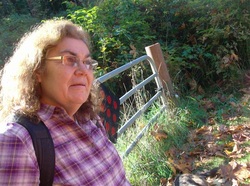
Jamie Valadez teaches Kallam language and Native American history at Port Angeles High School. The education Jamie had to get to become these things was a Bachelor Of Arts. Jamie got it at the Evergreen Sate College. She also had to get endorsements including Klallam language and social studies. Jamie also had to get an endorsement for Natural Resources for her to teach the Cultural and Natural Resources class 1. The skills Jamie needed are developing lessons, using effective teaching methods and working well with people.
When Jamie was in high school she wanted to be a teacher. She took Native American studies. She was a substitute for 3 years until the tribe hired her as a language teacher. Jamie ended up in Port Angeles High School because there were 5 elders left but they all passed away. So they needed someone to keep their native language going because they didn’t have a school on their reservation. In 2005 she started teaching Native American studies and in 2013 she started teaching Cultural and Natural Resources. It took Jamie 20 years to accomplish her dreams.
Jamie believes native people are interconnected with the land they live in. It is our responsibility to take care of the land. If we take care of the land the land will take care of us. Some of Jamie’s hobbies are gardening basket weaving. She also likes to spoil her grandkids. Jamie says when you take on a commitment to teach our language work till you die.
When Jamie was in high school she wanted to be a teacher. She took Native American studies. She was a substitute for 3 years until the tribe hired her as a language teacher. Jamie ended up in Port Angeles High School because there were 5 elders left but they all passed away. So they needed someone to keep their native language going because they didn’t have a school on their reservation. In 2005 she started teaching Native American studies and in 2013 she started teaching Cultural and Natural Resources. It took Jamie 20 years to accomplish her dreams.
Jamie believes native people are interconnected with the land they live in. It is our responsibility to take care of the land. If we take care of the land the land will take care of us. Some of Jamie’s hobbies are gardening basket weaving. She also likes to spoil her grandkids. Jamie says when you take on a commitment to teach our language work till you die.
Fred Sharpe, Alaska Whale Foundation
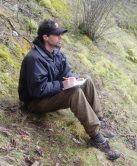
Fred Sharpe has been in love with whales ever since he went to a whale museum as a child. After that, Fred knew that becoming a whale biologist was his calling. The majority of the whales he sees are Humpbacks but occasionally he will see an orca or two. Fred loves to study whales, he said on the job you have to know everything about them. Fred mainly works in Alaska, but he also works in Washington, Oregon, and California. Fred states that “wherever the whales go, I go.” In Fred’s spare time he likes to listen to music and look at rocks. Fred’s advice to you if you are interested in joining this kind of job is to spend as much time with and learn as much as you can about animals. He also says that contacting people that work in this type of field
will help you achieve your goal.
will help you achieve your goal.
Hannah Merrill, Clallam County Department of Community Development
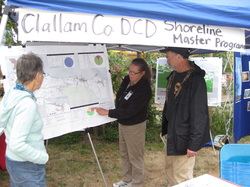
Since childhood, Hannah has loved nature. She showed it by becoming an educator at Olympic Park Institute. After teaching, she continued with her love of nature by becoming a ranger with the National Park Service. By virtue of being opportunistic and being open to change, Hannah has followed many employment paths which eventually let to her Planner position with Natural Resources for the Department of Community Development, which is her job today.
In her job she manages grants that are related to natural resources issues, such as measuring stream flow salmon recovery. Her favorite part about her job is working on projects that improve habitat for species and involve local residents. When asked what advice she would give someone going into a natural resources career she recommends: being open to opportunities and work locations; keep an open mind, and be persistent. Hannah views the human community as an integral part of the natural world and one of many communities dependent on unique natural resources. She endeavors to support human activity in a context that sustains and supports the health and longevity of precious assets.
Jonathan Scordino, Makah Nation
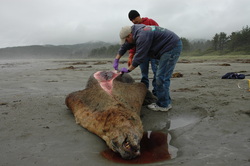
Jonathan Scordino was exposed to the natural resource field at a very young age (2 or 3 years old) by his father, who was a fisheries biologist. In high school, he was always outdoors camping, fishing, and hiking. He went on to study fisheries at the University of Washington and he got a master’s degree in wildlife science from Oregon State University. Jon’s favorite place that he has worked is in the Channel Islands in southern California off the coast of Santa Barbra. Jon is now the Marine Mammal Biologist with the Makah Tribe and his job is to protect the tribe’s treaty rights, as well as research the whales and sea lions around the coast of the Makah Reservation. His favorite part of his job is the whale research (whale watching). His advice to people entering the natural resources field is to take a lot of math and statistics classes, and he says, “Pursue what you love.”
Hansi Hals, Jamestown S'Klallam
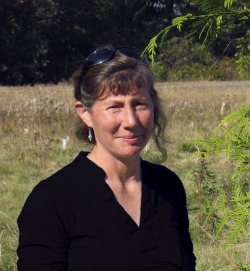
Hansi Hals has always had a real love of the outdoors and wild places. It was only natural to settle on a job that included being outside and worked toward conservation. Field work following college was fun and interesting (she still thinks it is) and graduate school increased her career opportunities. The Olympic Peninsula has been home for Hansi over 15 years and her children are growing up here. She particularly loves the Peninsula’s mountains and rivers. Her graduate field work was in Acadia National Park Maine which is beautiful, but seems very small (though not tame) in comparison to the Olympic Peninsula. Her favorite study spot to date is in the high country of the Sierra Nevada near Tuolomne Meadows. Now, Hansi works on multiple natural resource management issues for Jamestown S'Klallam Tribe including improving water quality and implementing restoration projects. Her most recent focus is thinking about stormwater management and appropriate treatment techniques. She is the Environmental Planning Manager for the Tribe, whose reservation is in Blyn and ancestral watershed is the Dungeness.
Robert Knapp, Clallam County
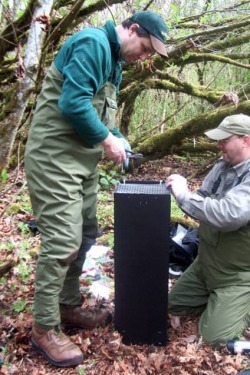
During Robert Knapp’s youth, many family vacations took him to the national parks of the Pacific Northwest, where he discovered a fascination with wildlife. Robert is especially fond of marmots. Moving to Port Angeles, Washington, to begin a career as an electrician gave Robert the opportunity to spend his free time observing the wildlife of the Olympic Peninsula. After 16 years as an electrician, Robert decided to study science. Robert obtained a Master’s degree from Western Washington University, where he worked on a number of wildlife research projects studying beavers, river otters, and other medium-sized animals in the Elwha Valley. Robert also spent a month researching wildlife, insects, plants, and soil in the rainforest of Costa Rica. Robert now occasionally teaches science as an adjunct professor at Peninsula College, and works for Clallam County, Washington, as an environmental scientist.
Kimberly Sager-Fradkin, Lower Elwha Klallam Tribe
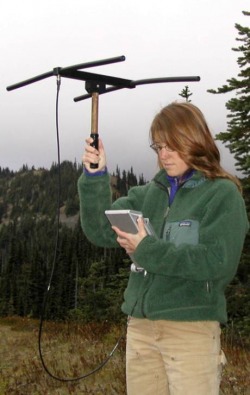
As a child in Montana, Kim Sager-Fradkin had a love of both animals and the outdoor world that inspired her to want to become a veterinarian. The realization that most veterinarians worked indoors, however, caused Kim to question her ambitions and seek other goals. It wasn’t until Kim traveled to Africa in her early twenties that she became enamored with the idea of studying wild animals. An exhaustive search through college catalogues made her realize that she could actually pursue a major in Wildlife Biology. She wholeheartedly embarked on this endeavor, attending Humboldt State University and completing her degree in 1996. Kim landed in Port Angeles, Washington, in 1999 and has helped develop a black bear management program for Olympic National Park, surveyed for the elusive marbled murrelet, and tracked black-tailed deer for the USGS. She settled into a graduate program at the University of Idaho, obtaining a Master’s degree by studying black bear distribution patterns in the Elwha Valley. Currently, Kim is a wildlife biologist for the Lower Elwha Klallam Tribe where she spends her time studying everything from otters to elk.
Dr. Kurt Jenkins, USGS Forest and Rangeland Ecosystem Science Center
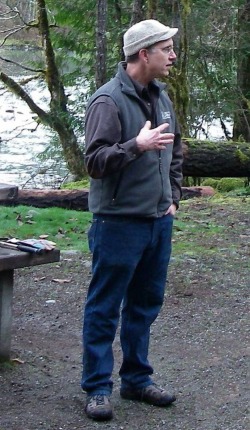
As a teen, Kurt Jenkins decided to pursue a career working in the National Parks as either a ranger or a biologist. His interests were kindled by his family’s long association with Yosemite National Park and his frequent trips hiking in the Sierra Nevada. An inspirational zoology professor at University of California-Davis and a summer spent working as an undergraduate biological intern at Olympic National Park convinced Kurt that a career in wildlife research in the National Parks was his calling. To pursue his goals he completed graduate degrees with National Park Service research units at Oregon State University and the University of Idaho, studying the ecology of elk and other large mammals in Olympic and Glacier National Parks. He taught at South Dakota State University for a few years before switching to work as a wildlife research biologist with the National Park Service in Alaska. For the last 18 years, Kurt has worked as a wildlife research biologist with the National Park Service and the USGS providing research in support of wildlife management issues and monitoring programs, with a primary focus on mammalian ecology in the National Parks.
Dr. Patti Happe, Olympic National Park
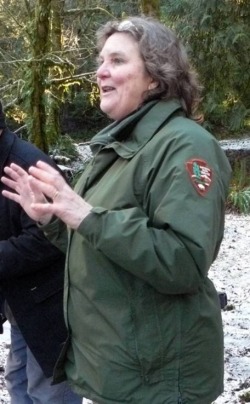
Patti Happe’s desire to study wildlife stemmed from her childhood walks with her grandfather on his farm and was cemented on a trip throughout the Rocky Mountains with her grandparents when she was a teen. Although her career path has always been heading towards that goal, the route was sometimes circuitous, because at the time few women entered wildlife ecology. Her degrees include a Bachelor’s in Environment Resource Management from Penn State University, as well as a Master’s in Wildlife Ecology and a Ph.D. in Rangeland Ecology from Oregon State University. Patti has worked a variety of jobs, ranging from Environmental Specialist (focusing on mining impact analysis and compliance), to Dairy Science, to her current job as the lead wildlife biologist for Olympic National Park, where she has been for the past 12 years. In this job Patti works on both research and management and is responsible for all wildlife species in the park.
Nate Chelgren, USGS Forest and Rangeland Ecosystem Science Center
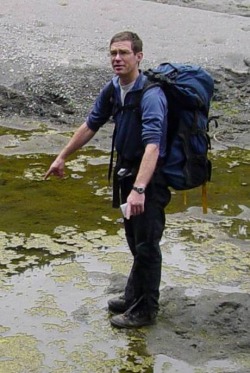
Nate Chelgran pursued a career in wildlife research because of his interest in the environment and in mathematics. Ecological research is the perfect field where both interests come together. Nate began by studying migratory birds. This interest then expanded to include other kinds of animals, such as amphibians. Many amphibians also migrate, often between fresh water habitats where they lay eggs and forested habitats where they reside as adults. Because they are less mobile than birds, amphibians are affected differently by roads and other types of development that can block migration routes. Nate now conducts research for the U.S. Geological Survey to provide information about how populations of animals-like amphibians, birds, and other groups-can best be conserved when their habitat is under pressure to be changed to meet competing human needs, such as wood production or the generation of electricity.
Sam Brenkman, Olympic National Park
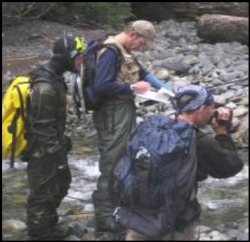
Sam Brenkman grew up in Madison, Wisconsin, and was introduced to streams and fishing at an early age by his grandfather. He began studies in biology and natural resource management at the University of Wisconsin, and later completed degrees at Oregon State University. His interest in the management and conservation of native fishes grew after spending years of adventure and work in the Blue Mountains, Klamath Basin, lower Columbia River, and coastal portions of Oregon and Washington. Sam’s interests in fisheries conservation peaked after traveling to study fish populations in remote portions of Iceland. Today, Sam and his co-workers at Olympic National Park work to manage 12 major watersheds, 31 freshwater fish species, and over 70 populations of Pacific salmonids throughout 922,000 acres of Olympic National Park.
Jeff Duda, U.S. Geological Survey
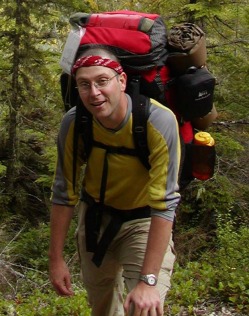
Ever since his grandfather took him on long fishing trips in the Canadian wilderness, Jeff Duda has had a love of rivers and the many different kinds of organisms that can be found under water. He began seriously studying the biology of rivers and lakes in college at the Fish Lake Biological Station in Lapeer, Michigan. Here he learned that people could make a living by studying nature and spending a lot of time outdoors. He took a detour from studying wet things when he went to work in the Mojave Desert to study the desert tortoise. Since his MS thesis in 1998, he has returned to studying rivers and streams in Wyoming, California, Georgia, and Washington. He has studied fish, salamanders, and invertebrates, focusing effort on trying to figure out what things make populations of these organisms tick.
Sarah Morley, NOAA Fisheries
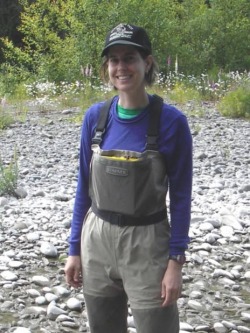
Sarah Morley grew up in Seattle but never saw salmon spawning in the wild until she was an adult. She got hooked on studying streams when she went to college and got to do a research project on benthic invertebrates in a small agricultural stream in Costa Rica. After coming back to the Northwest, she decided she wanted to spend as much time as possible being near streams and rivers and learning how to help keep them healthy. In graduate school at the University of Washington she studied how urbanization affects the creatures living in streams. As a member of the Restoration Team at NOAA’s Northwest Fisheries Science Center, Sarah gets to spend a lot of her time wading around in rivers and helping to figure out what types of restoration are working.
Barbara Blackie, Peninsula College Biology Professor
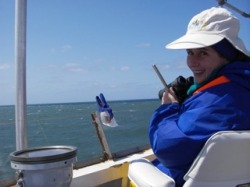
After attending a convincing presentation about rehabilitating puffins on Tatoosh Island, Barbara Blackie contacted the head organizer of that organization, who suggested that she join the Peregrine Association. This got her started in her career in natural resources. Her education consists of a Bachelors Degree in Zoology from Miami (Ohio), Masters Degree in Education and a Masters Degree in Wildlife from Oregon State University. Past jobs relating to Natural Resources include Research Specialist for Olympic Coastal National Marine Sanctuary, Biology Tech for Fish and Wildlife in Alaska and Biology Tech for Forest Service in Washington and Alaska. Because of the diversity of habitats, Barbara decided that the North Olympic Peninsula was the best place for her. She has spent a lot of time living here studying the Elwha, Ornithology, and off-coast marine life. Her favorite part of her job is the excitement of educating people to connect with the environment, hopefully inspiring people to contribute to the improvement of the natural community.
Margaret Stultz, Olympic Park Institute
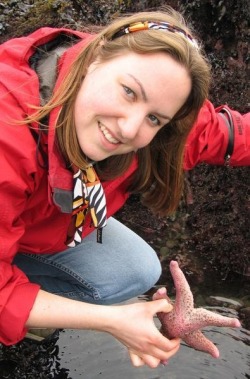
Margaret found her passion and was inspired to a natural resources career in college when she was told she had to take a geology class. Margaret got her bachelor’s degree from Sewanee University in Southern Tennessee. Margaret also traveled to Hawaii, and while there she went on a lot of backpacking and camping trips, providing further motivation for a career in natural resources. Margaret has worked as an environmental educator various places in California and Washington. She enjoys seeing students active and excited to be working outside. Margaret’s advice for if you are going become a natural resources professional is that you should be happy to work outside and just have fun. However, Margaret’s current job doesn’t let her go outside much. Right now she works for Olympic Park Institute as program director.
Mike Edwards, Muckleshoot Tribe
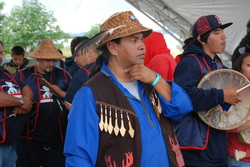
After joining the Muckleshoot Canoe Family for Tribal Journeys in 2005, Paddle to Lower Elwha, Mike has decided to step up and become the Culture Coordinator for Muckleshoot Tribe.
Although he is always on the go, he really enjoys his job. He says it’s a fascinating job to have. Being a Cultural Coordinator, you have to be prepared
to have a big and challenging job. During tribal journeys his job is to be responsible for keeping everybody healthy and safe. Before and after tribal
journeys he gets the whole canoe family ready for the next journey. Here are some examples of the event planning Mike does in his job. Mike schedules canoe practice, which usually starts in the spring; he schedules certain nights for regalia and gift making. He schedules nights for canoe family meetings, to discuss when the tribal journey/skipper meetings are; he also has to make sure who plays which role in the canoe family, such as who’s the cook, who’s the skipper, and who stays behind as ground crew to help set up and take the campsite down. Mike’s advice to anyone who is interested into working for cultural resources is to have strong life skills such as being able to problem solve difficult situations like vehicles breaking down, everyone’s different attitudes, running late, or having to work with bad weather, and be able to plan events. Mike also advises that you should learn as much as you can about your culture and pass it on! His favorite thing to do in his free time is enjoy family time and travel to bone games, which is another cultural event. Here is
some more information on bone games: http://www.4directions.org/resources/features/si99/instituteprod/slahal/.
Although he is always on the go, he really enjoys his job. He says it’s a fascinating job to have. Being a Cultural Coordinator, you have to be prepared
to have a big and challenging job. During tribal journeys his job is to be responsible for keeping everybody healthy and safe. Before and after tribal
journeys he gets the whole canoe family ready for the next journey. Here are some examples of the event planning Mike does in his job. Mike schedules canoe practice, which usually starts in the spring; he schedules certain nights for regalia and gift making. He schedules nights for canoe family meetings, to discuss when the tribal journey/skipper meetings are; he also has to make sure who plays which role in the canoe family, such as who’s the cook, who’s the skipper, and who stays behind as ground crew to help set up and take the campsite down. Mike’s advice to anyone who is interested into working for cultural resources is to have strong life skills such as being able to problem solve difficult situations like vehicles breaking down, everyone’s different attitudes, running late, or having to work with bad weather, and be able to plan events. Mike also advises that you should learn as much as you can about your culture and pass it on! His favorite thing to do in his free time is enjoy family time and travel to bone games, which is another cultural event. Here is
some more information on bone games: http://www.4directions.org/resources/features/si99/instituteprod/slahal/.
